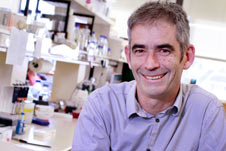 Friday 13 February 2015 4:31pm
Friday 13 February 2015 4:31pm Professor Parry Guilford
Professor Parry Guilford
A University of Otago researcher who helped discover a key genetic mutation that causes familial stomach cancer is part of an international team that has now provided the first accurate risk estimates for those who carry it.
Otago's Professor Parry Guilford is a co-author of a new Canadian-led study providing data that will allow genetic counselors to help families around the world carrying mutations in the E-cadherin gene (CDH1) to determine which cancer risk reducing options are right for them.
Hereditary diffuse gastric cancer is a rare condition that can result in aggressive, early-onset cancers of the stomach and breast across several generations of a family.
To establish the risk estimates researchers undertook a detailed analysis of 75 families with a strong family history of the deadly cancer, including a Bay of Plenty whanau who lost 25 members to the disease within the space of 30 years.
The study, led by the BC Cancer Agency and appearing in the US journal JAMA Oncology, reports the following cancer risk estimates for individuals with a CDH1 genetic mutation:
• 70% risk for men (stomach cancer)
• 56% risk for women (stomach cancer)
• 42% risk of lobular breast cancer for women
Lobular breast cancer is harder to detect by mammography than other forms of breast cancer, often delaying its diagnosis.
Professor Guilford says the new study will help better inform whether or not preventative surgery, such as removal of the stomach or mastectomies, is the best treatment option for those carrying a CDH1 gene mutation.
“The scale of this study, and its international breadth, highlights how hundreds of people from around the world have had their lives saved thanks to the determination of the Maori stomach cancer families to tackle the problem head on,” he says.
The study also shed light on what is causing gastric cancers in 60 per cent of families with multiple gastric cancers but no CDH1 mutations by identifying other genes that may predispose individuals to this deadly disease.
This work has led to a global collaborative effort to look at these genes in conjunction with CDH1 to uncover the disease-causing mutations in a broader number of families.
Professor Guilford and his team at the University's Centre for Translational Cancer Research are continuing their research into Hereditary Diffuse Gastric Cancer. Their work includes developing drugs to be used for the prevention of gastric and breast cancer in these high risk families, thereby providing the means to delay or avoid major surgery at a young age.
For more information, contact:
Professor Parry Guilford
Centre for Translational Cancer Research
University of Otago
Email parry.guilford@otago.ac.nz
A list of Otago experts available for media comment is available elsewhere on this website.
Electronic addresses (including email accounts, instant messaging services, or telephone accounts) published on this page are for the sole purpose of contact with the individuals concerned, in their capacity as officers, employees or students of the University of Otago, or their respective organisation. Publication of any such electronic address is not to be taken as consent to receive unsolicited commercial electronic messages by the address holder.